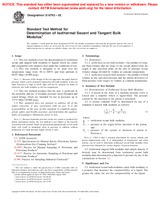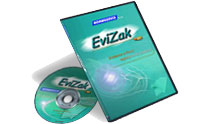Potřebujeme váš souhlas k využití jednotlivých dat, aby se vám mimo jiné mohly ukazovat informace týkající se vašich zájmů. Souhlas udělíte kliknutím na tlačítko „OK“.
ASTM D6793-02
Standard Test Method for Determination of Isothermal Secant and Tangent Bulk Modulus
Automaticky přeložený název:
Standardní zkušební metoda pro stanovení Izotermní sečná a Tangent Bulk Modul
NORMA vydána dne 10.4.2002
Informace o normě:
Označení normy: ASTM D6793-02
Poznámka: NEPLATNÁ
Datum vydání normy: 10.4.2002
Kód zboží: NS-36560
Počet stran: 5
Přibližná hmotnost: 15 g (0.03 liber)
Země: Americká technická norma
Kategorie: Technické normy ASTM
Anotace textu normy ASTM D6793-02 :
Keywords:
density, dynamic bulk modulus, isentropic bulk modulus, isothermal bulk modulus, isothermal secant bulk modulus, isothermal tangent bulk modulus, pressure, static bulk modulus, ICS Number Code 75.160.20 (Liquid fuels)
Doplňující informace
| 1. Scope | ||||||||
|
1.1 This test method covers the determination of isothermal secant and tangent bulk modulus of liquids which are stable and compatible with stainless steel under the conditions of test. 1.2 This test method is designed to be used over the temperature range from -40 to 200°C and from ambient to 68.95 Mpa (10 000 psig). Note 1—Because of the design of the test apparatus, the upper limit of pressure which can be attained is limited by the bulk modulus of the test fluid. Pressures as high as 68.95 Mpa will not be attained for fluids of relatively low bulk modulus at the test temperature. 1.3 This test method assumes that the user is proficient in the assembly and use of medium pressure (m/p) threaded and coned fittings which are intended for use at pressures up to 137.9 Mpa (20 000 psig). 1.4 This standard does not purport to address all of the safety concerns, if any, associated with its use. It is the responsibility of the user of this standard to establish appropriate safety and health practices and determine the applicability of regulatory limitations prior to use. Note 2—Because hydraulic pressure in the test system is produced by purely mechanical means, the test method is not subject to the hazards associated with systems which are pressurized pneumatically. Even small leaks will result in immediate drop in pressure to ambient without production of a high pressure liquid stream or mist. |
||||||||
| 2. Referenced Documents | ||||||||
|
Doporučujeme:
EviZak - všechny zákony včetně jejich evidence na jednom místě
Poskytování aktuálních informací o legislativních předpisech vyhlášených ve Sbírce zákonů od roku 1945.
Aktualizace 2x v měsíci !
Chcete vědět více informací? Podívejte se na tuto stránku.




 Cookies
Cookies
